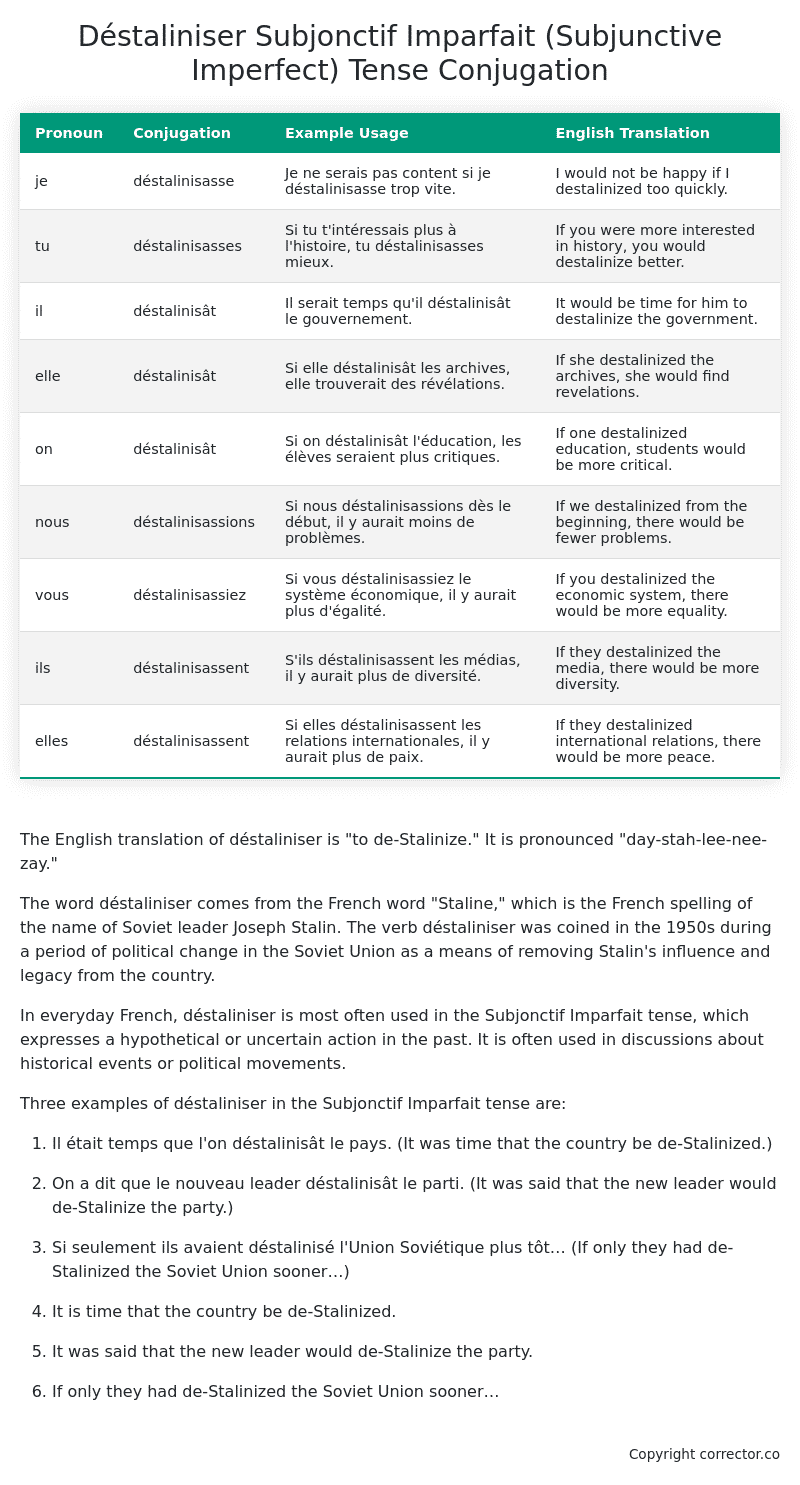Subjonctif Imparfait (Subjunctive Imperfect) Tense Conjugation of the French Verb déstaliniser
Introduction to the verb déstaliniser
The English translation of déstaliniser is “to de-Stalinize.” It is pronounced “day-stah-lee-nee-zay.”
The word déstaliniser comes from the French word “Staline,” which is the French spelling of the name of Soviet leader Joseph Stalin. The verb déstaliniser was coined in the 1950s during a period of political change in the Soviet Union as a means of removing Stalin’s influence and legacy from the country.
In everyday French, déstaliniser is most often used in the Subjonctif Imparfait tense, which expresses a hypothetical or uncertain action in the past. It is often used in discussions about historical events or political movements.
Three examples of déstaliniser in the Subjonctif Imparfait tense are:
-
Il était temps que l’on déstalinisât le pays. (It was time that the country be de-Stalinized.)
-
On a dit que le nouveau leader déstalinisât le parti. (It was said that the new leader would de-Stalinize the party.)
-
Si seulement ils avaient déstalinisé l’Union Soviétique plus tôt… (If only they had de-Stalinized the Soviet Union sooner…)
-
It is time that the country be de-Stalinized.
-
It was said that the new leader would de-Stalinize the party.
-
If only they had de-Stalinized the Soviet Union sooner…
Table of the Subjonctif Imparfait (Subjunctive Imperfect) Tense Conjugation of déstaliniser
| Pronoun | Conjugation | Example Usage | English Translation |
|---|---|---|---|
| je | déstalinisasse | Je ne serais pas content si je déstalinisasse trop vite. | I would not be happy if I destalinized too quickly. |
| tu | déstalinisasses | Si tu t’intéressais plus à l’histoire, tu déstalinisasses mieux. | If you were more interested in history, you would destalinize better. |
| il | déstalinisât | Il serait temps qu’il déstalinisât le gouvernement. | It would be time for him to destalinize the government. |
| elle | déstalinisât | Si elle déstalinisât les archives, elle trouverait des révélations. | If she destalinized the archives, she would find revelations. |
| on | déstalinisât | Si on déstalinisât l’éducation, les élèves seraient plus critiques. | If one destalinized education, students would be more critical. |
| nous | déstalinisassions | Si nous déstalinisassions dès le début, il y aurait moins de problèmes. | If we destalinized from the beginning, there would be fewer problems. |
| vous | déstalinisassiez | Si vous déstalinisassiez le système économique, il y aurait plus d’égalité. | If you destalinized the economic system, there would be more equality. |
| ils | déstalinisassent | S’ils déstalinisassent les médias, il y aurait plus de diversité. | If they destalinized the media, there would be more diversity. |
| elles | déstalinisassent | Si elles déstalinisassent les relations internationales, il y aurait plus de paix. | If they destalinized international relations, there would be more peace. |
Other Conjugations for Déstaliniser.
Le Present (Present Tense) Conjugation of the French Verb déstaliniser
Imparfait (Imperfect) Tense Conjugation of the French Verb déstaliniser
Passé Simple (Simple Past) Tense Conjugation of the French Verb déstaliniser
Passé Composé (Present Perfect) Tense Conjugation of the French Verb déstaliniser
Futur Simple (Simple Future) Tense Conjugation of the French Verb déstaliniser
Futur Proche (Near Future) Tense Conjugation of the French Verb déstaliniser
Plus-que-parfait (Pluperfect) Tense Conjugation of the French Verb déstaliniser
Passé Antérieur (Past Anterior) Tense Conjugation of the French Verb déstaliniser
Futur Antérieur (Future Anterior) Tense Conjugation of the French Verb déstaliniser
Subjonctif Présent (Subjunctive Present) Tense Conjugation of the French Verb déstaliniser
Subjonctif Passé (Subjunctive Past) Tense Conjugation of the French Verb déstaliniser
Subjonctif Imparfait (Subjunctive Imperfect) Tense Conjugation of the French Verb déstaliniser (this article)
Conditionnel Présent (Conditional Present) Tense Conjugation of the French Verb déstaliniser
Conditionnel Passé (Conditional Past) Tense Conjugation of the French Verb déstaliniser
L’impératif Présent (Imperative Present) Tense Conjugation of the French Verb déstaliniser
L’infinitif Présent (Infinitive Present) Tense Conjugation of the French Verb déstaliniser
Struggling with French verbs or the language in general? Why not use our free French Grammar Checker – no registration required!
Get a FREE Download Study Sheet of this Conjugation 🔥
Simply right click the image below, click “save image” and get your free reference for the déstaliniser Subjonctif Imparfait tense conjugation!

Déstaliniser – About the French Subjonctif Imparfait (Subjunctive Imperfect) Tense
Formation
Common Everyday Usage Patterns
Interactions with Other Tenses
Subjonctif Présent
Indicatif Passé Composé
Conditional
Conditional Perfect
Summary
I hope you enjoyed this article on the verb déstaliniser. Still in a learning mood? Check out another TOTALLY random French verb conjugation!


